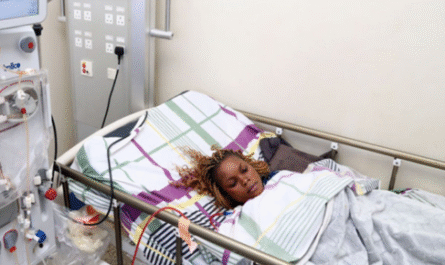
Acute pancreatitis can change your life in the blink of an eye. It usually starts in the pancreas and causes several other complications. One of the complex conditions that acute pancreatitis can cause is Acute Respiratory Distress Syndrome (ARDS). But you may think, how does an issue that arises in the pancreas will cause a crisis in the lungs? Further, this blog will give answers to all your questions.
What is acute pancreatitis?
Before knowing what acute pancreatitis can cause, it is important to understand what acute pancreatitis is. Acute pancreatitis is nothing but a sudden inflammation of the pancreas, which is a vital organ, that plays a crucial role in digestion and blood sugar regulation. Once the pancreas is inflamed, its enzymes will begin to attack the tissue of the pancreas instead of helping with digestion.
Acute pancreatitis can be caused by several triggers like gallstones, binge alcohol consumption, infections, few medications, and high levels of triglycerides in the blood. At times, the actual cause remains unknown, which may cause serious health issues, and immediate medical treatment is required.
What are the symptoms of acute pancreatitis?
Usually, the acute pancreatitis starts with abdominal pain and radiates to
– Nausea
– Vomiting
– Fever
– Rapid pulse
The pain will be very intense and constant, making it tough to ignore. So whenever experiencing these symptoms, consider visiting the best gastro hospital in Coimbatore to stop the further progression.
What’s the link between acute pancreatitis and ARDS?
– ARDS:
Acute Respiratory Distress Syndrome (ARDS) is one of the threatening conditions that develops when fluid builds up in the small air sacs in your lungs. This fluid stops your lungs from filling with sufficient air, resulting in severe breathing problems, and only a small amount of oxygen will reach your lungs.
How does acute pancreatitis lead to ARDS?
Whenever acute pancreatitis develops, the body reacts with an intense inflammatory response. This inflammation doesn’t stay localized in the pancreas and spreads throughout the body, disturbing several other organs, like the lungs.
When affected by acute pancreatitis, inflammatory mediators such as cytokines are released into the bloodstream. These mediators can trigger an inflammatory response in the lungs, resulting in increased permeability of the lung capillaries. Eventually, the fluid leaks into the alveoli, causing ARDS.
How does ARDS develop from acute pancreatitis?
Automatically, when acute pancreatitis occurs, it will lead to ARDS. Firstly, the pancreas becomes inflamed, releasing enzymes and inflammatory mediators into the bloodstream. These mediators travel to the lungs, causing inflammation and damage to the lungs.
One of the hallmarks of ARDS is pulmonary edema, in this condition, the fluids will get stored in the lungs. This fluid will prevent the lungs from filling with air, resulting in serious oxygen deprivation in the body. Pulmonary edema in ARDS is the result of an inflammatory process initiated by acute pancreatitis.
When the lungs get filled with fluid, the oxygen and carbon dioxide exchanging ability will be impaired, resulting in hypoxemia, a harmful low level of oxygen in the blood. Hypoxemia is a crucial component of ARDS and results in organ failure if not treated properly.
What are the signs and progressions?
Individuals with ARDS usually face severe shortness of breath, fast breathing, and a drop in blood oxygen levels. One will face this set of symptoms within hours to days after the initial trigger.
When ARDS progresses, individuals will face worsening respiratory distress, cyanosis, and confusion. This is a serious condition that needs medical ventilation to help breathing.
How to diagnose ARDS with acute pancreatitis?
The diagnosis of ARDS involves a series of approaches like observing clinical signs and symptoms, as well the diagnostic tests. These may include X-rays, blood gas analysis, and CT scans to identify the extent of lung infection.
Also, you should know to differentiate ARDS from other respiratory conditions that can develop due to acute pancreatitis, like pneumonia or pleural effusion. These conditions require a thorough evaluation by a medical professional.
How to treat this condition?
– Treating the underlying cause:
If acute pancreatitis secondarily causes ARDS, treating the underlying pancreatitis is crucial. This may involve addressing the gallstones, managing alcohol use, or treating infections.
– Supportive care:
The vital thing to treat ARDS is supportive care, which includes, providing oxygen, often by medical ventilation, to confirm the patient receives sufficient oxygen to sustain their organs.
– Medications and therapies:
Medications will be given to reduce inflammation and support lung function may be used in treating ARDS.
– Potential for recovery:
Recovering from ARDS is a long-term process, and some individuals will face lasting effects. Also, with appropriate and timely treatment, several individuals can recover and regain much of their lung function.
How to prevent ARDS in acute pancreatitis patients?
Like all diseases, prevention for ARDS starts with timely detection, and management of acute pancreatitis is also crucial. Simply, by addressing the pancreatitis promptly, the risk of ARDS can be potentially reduced.
– Managing risk factors:
Managing the risk factors of both ARDS and acute pancreatitis like avoiding binge consumption of alcohol, maintaining healthy triglyceride levels, and controlling infections can reduce the likelihood of these conditions.
– Early intervention:
For individuals with acute pancreatitis, close monitoring, and timely intervention are key to preventing the progression to ARDS. This includes regular assessment of lung function and oxygen levels. Further, the early intervention includes gettingpancreas treatment in Coimbatore.
Final thoughts:
In conclusion, we can say that both acute pancreatitis and ARDS are two serious health issues that, unfortunately, can occur at the same time. The inflammation that develops in the pancreas can spread, affecting the lungs, and can lead to serious respiratory distress. Understanding the connection between these conditions is vital for timely intervention and treatment.



